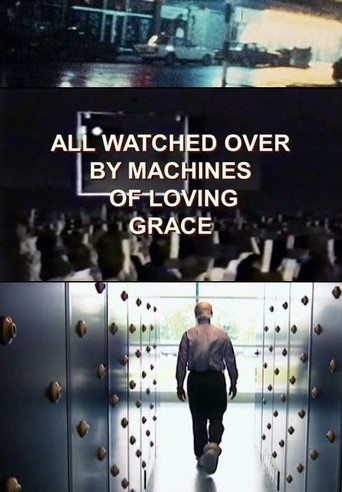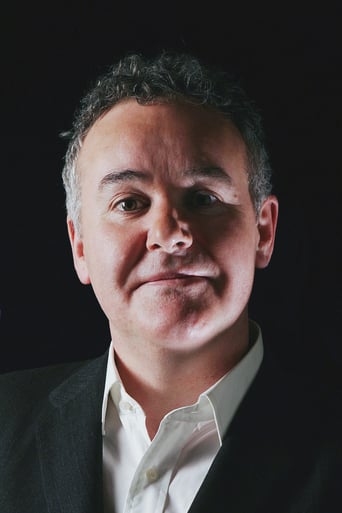
A series of films about how humans have been colonized by the machines we have built. Although we don't realize it, the way we see everything in the world today is through the eyes of the computers.
Reviews
You won't be disappointed!
Pretty Good
Please don't spend money on this.
A movie that not only functions as a solid scarefest but a razor-sharp satire.
big ideas. At some point though, I began to feel that the narrator is manipulating information to conform to his conclusions. For instance, he attacks the global financial system and its architects, and portrays them as causing only suffering. But he leaves out the huge increase in global prosperity that has occurred over the last decades. He says that China kept its exchange rate artificially low, and used the trade surplus to lend back to the US instead of helping its own citizens. He leaves out that average Chinese citizen's income is maybe 7 to 10 times what it was 25 years ago. There's a story here and it's not all good or bad. The characters highlighted in the film are interesting and important - but the film misses an opportunity to reveal something more profound about the mysteries of our times - instead I think it leads viewers to simplistic conclusions that can perhaps be as damaging or more than Ayn Rand's philosophies.
I generally watch documentaries based upon the topic or theme e.g. nuclear issues, language studies, ancient history, climate change and so on. Rarely do I watch one based upon the title only.This three-part examination of the relationship of computers to society is an exception: I was so intrigued by the title, having come from career of forty years in computers prior to my escape from corporate life, that I just had to see it.I wasn't disappointed. The writer/director (Adam Curtis) combines stock footage of computers, city and urban scenes, moody or discordant music, crowd scenes, famous people and a clever, cogent argument in an attempt to show the extent to which humanity has become entrapped by the IT revolution since the 1950s. It's a three part series and definitely worth every minute of your time. But, it's not only about computers...For starters, in Part 1, I could easily relate to Curtis's slant on the link between the extreme socio-economic philosophy of Ayn Rand that helped to influence Alan Greenspan's view of the world before and after various financial calamities, and up to the catastrophe of 2008. All of which was only possible – a crucially important fact – by pervasive, global computer technology used by greedy and opportunistic bankers, speculators and investors, all acting in their own self-interest.I can vouch for that, having been an insider with the online IT divisions of various banks in the UK and North America for fifteen years in the 1970s and 1980s. The standing joke in banks: you can't trust bankers. Wink, wink, nudge, nudge...Part 2 debunks the idea that nature is in equilibrium or seeks to find equilibrium. Instead, nature is in a constant state of flux and change, chaotic and unpredictable – and hence dangerous. (And, like it or not, humanity is part of nature.) This should be obvious – think of daily weather patterns globally. Curtis here links the emerging social networks as analogous to the chaos of nature which, coupled with our cancerous over-dependency upon computer technology, can only result in more unpredictability, uncertainty and opportunity for disaster. It's more than likely, I think, that Curtis is correct. To what extent, ultimately, is obviously opaque.Part 3 finishes the job in a somewhat elliptical fashion: you must follow the logic closely as we are introduced to an eminent scientist, William D. Hamilton and a brilliant mathematical genius, George R. Price. They argued that the real culprit in our chaotic existence is The Selfish Gene, a description that is now the title of Richard Dawkins's book that made him famous globally (It's an interesting, persuasive book and worth reading.) Humanity is then characterized as "soft" computer driven automata, explicitly removing the possibility of any spiritual or divine influence in human affairs.I can live with that, having decided long ago that we are all but organic machines with brains far, far superior to those "brains" of digital computers – thankfully. And the conclusion that crystallizes the essence of altruism – Ayn Rand's mortal enemy – is a tour de force of ironic tragedy.Graphically horrific images from recent depravities in Africa are interwoven to illustrate and prove the case; but it would totally spoil the finale to say anymore.Perhaps the editing of the series and some jump cutting are a mite fast at times; and the sound appears to fade occasionally. Apart from that, I highly recommend investing the three hours.Is Curtis showing us heaven on earth? See the movie. You be the judge.November 2011.
I agree with a lot of what has been written about this documentary, but I think some people miss the point. The documentary starts out being almost a Terminator inspired sub-title "The rise of the machines" and describes all the evil machines, but at the end the conclusion is *we* are the machines, the our DNA is the program. Viewed in that light, computers are mere extensions of ourselves and in a way are an attempt to make the computational abilities of the brain more perfect. There are still many, many things the organic brain can do better than a computer, subtle things like social intelligence, body language, emotional intelligence. These are more difficult to encode in a computer because they don't follow the same rules as simply adding 1+1. It is clear evidence that we don't exactly understand the process ourselves, which is why we can't program it into a computer.As I watched this documentary, I was floored by the similarities to a audibook I was listening to by the Dalai Lahma which talked about altruism and how it fits into the selfish gene model. Obviously Dalai Lahma takes a very different view on altruism, believing that it represents a higher function of human existence that cannot be explained by Darwinian view of the selfish gene. This documentary takes the counter view that altruism is just another way of preserving the gene, but it stumbles a little bit by only giving altruistic examples where the individual sacrifices itself for the continuation of it's relatives or the destruction of non-relatives. What about altruistic acts which are for the benefit of non-relatives? There is no adequate scientific explanation for this, yet it happens continuously throughout history. Then again, perhaps it is just another form of insanity.In any case, this documentary is not about computers taking over the world, it is about the belief of HUMANS AS MACHINES and this BELIEF taking over the world. Curtis does not go back farther than Ayn Rand and the 1930s, but surely this idea started with Nietszche and Darwin. In fact then Rand said that Aristotle was the only philosopher that influenced her, I found that hard to believe, because her ideas sound very similar to Nietszche's. This struggle is often interpreted politically as right vs left, materialism vs idealism, capitalism vs socialism.When Curtis ventures into the realm of the online world, here too he stumbles, he attempts to show that "cyberspace" was developed to try and imitate the stable natural ecosystem, but in reality was extremely chaotic. Yes, the online world of blogs, email, texts and tweets can be a mess, but if you look at the growth of illegal downloading, this is surprisingly stable, coherent and efficient. This system of peer-to-peer downloading arose completely spontaneously, and has developed into an extremely reliable way of downloading content, which has built in self regulating processes. This is surprisingly similar to the way a natural ecosystem might develop, including the existence of viruses and anti-viruses.Even with all it's flaws, I can't help but be awe-struck by the Herculean and virtuosic editing techniques used by Curtis, and the unique and incredibly moving use of music to juxtapose against various images. It can be cliché to superimpose happy music over tragic images, but Curtis does it such a way that it just seems brilliant. It's like Tarantino meets David Attenborough meets Radiohead. I would be very surprised if Curtis chooses the music himself, it's hard to imagine someone with such a stuffy English accent could be so hip, but appearances can be deceiving.I highly encourage anyone seeing this to watch his other documentaries, they are all done in his trademark style, which is unique and, at least artistically, unmatched in the documentary world.
Adam Curtis' recent documentary series disappointed some. Compared to his work on The Century Of The Self and The Power Of Nightmares, it seemed hodge podge, lacking a central framework idea and bouncing all over the place.After twenty minutes of the first episode, I may have been inclined to agree – the documentary seemed to lack focus and carried over the experimental mix of music and image that had been used so successfully for the interactive theatre piece "It Felt Like A Kiss".However, having seen the full piece, I now beg to differ. If anything, the series is a broader and more satisfying development of areas touched on in his previous pieces, particularly Century Of The Self.As with Curtis' other work, it explores the far reaching and (for the most part) unintended consequences of big ideas. In this case, the idea that nature can be explained and entertainingly presents a series of case studies to explore whether this idea is flawed or not. Unlike his previous pieces, the period under discussion is very recent and the ideas explored so varied that each episode does not really follow a linear timeline and the debates bounce from the 1950s to the 1990s to the 1960s to the present day.This is a powerful and thought provoking piece, Curtis never comes across to me as polemical and seems happier drawing your attention that things may not be quite as they seem rather than hitting you over the head as he proves everything you know is wrong.Everything you know isn't necessarily wrong but it may be that you aren't fully informed of all the facts. The opening sequence may be the the weakest of the series, linking Ayn Rand's ideas of Objectivism to the development of moden computing. However, clever dick that Curtis is, it only becomes apparent with the patience to sit through this that the central character isn't Rand at all but a member of her social circle, Alan Greenspan – who, as chairman of the US Federal Reserve became, through a series of unforeseen events, the most powerful man in the world for a brief period.The subsequent rattle through the economic crises in the Far East in the 90's and the knock on effect to the current economic crisis in the West (and China's part in it) is eye opening to say the least. And it goes on, finding short degrees of separation from a multitude of players on the world stage, linked by the rise and consequences of ideas relating to systems. The second episode then explores the theory of self organising networks through cybernetics, eco politics, the geodesic dome, the 60s counterculture, maximum population growth to the Facebook/Twitter revolutions of the 2000s.I was especially impressed with the final episode exploring the theory of the selfish gene, moving from the initial theory through Anglo- American intervention in the Congo, myths on the origins of the AIDS virus, the Belgians role in the genocide of Rwanda through Richard Dawkins and Dian Fossey.Fascinating stuff and well worth three hours of anyone's time.
Top Streaming Movies















